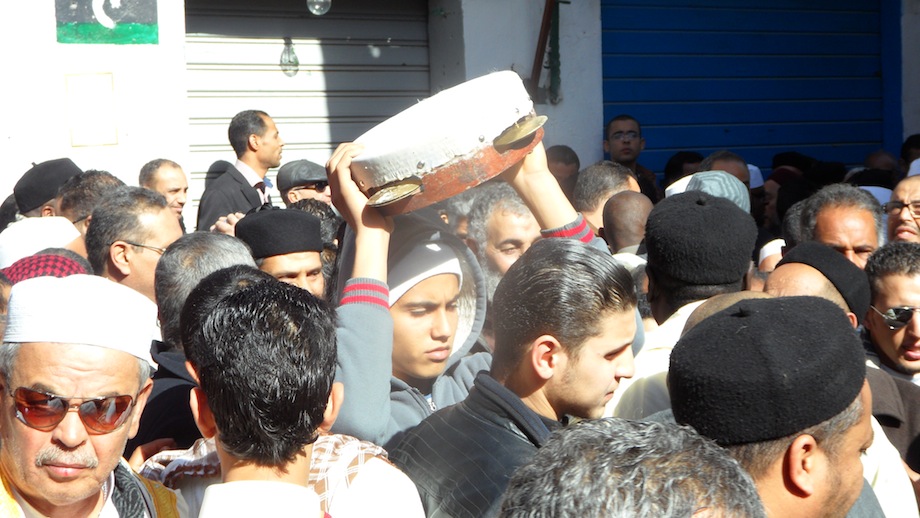By Rzszard Bouvier.

Tripoli, 24 January 2013:
Hundreds of Tripolitans gathered this morning in the capital’s Old City to celebrate Mawlid Al-Nabi, the Prophet’s . . .[restrict]birthday, in the traditional manner. The hadhra is a collective ritual performed by Sufi orders that usually includes spiritual chants accompanied by drums, tambourines and flutes, elevating into rhythmic prayers to God.
The procession started off at one of the Sufi zawias (schools) in the centre of the Old City. As it moved through the narrow alleys, more people gradually joined in. The mood was ceremonious and joyful, with the crowd moving to the rhythm of the music, women ululating and children climbing on walls to get a better view. In spite of public controversies over Mawlid in the days leading up to event, there was no tension in the air and surprisingly little security, at least during the morning hours. However, recent events clearly do occupy people’s minds. “Benzina” (petrol), some youth shouted spontaneously when a man began flicking flower-scented water over the crowd.
This year, the holding of Mawlid ceremonies was condemned by Salafi groups who disapprove of what they claim is a deviant practice of Islam and idolatry worship. More generally, they reject the way Sufi Tariqas (orders) express faith through dancing and music. Several conservative preachers urged Libyans not to observe the Prophet’s birthday and even the Dar Al-Ifta, the official religious authority, issued a statement saying that it was not part of the four main schools of Islam.
But there also appear to have been some more serious threats, with rumours claiming that at least two mosques in and around Tripoli were targeted by minor explosions in the past few days, supposedly as a warning to Sufi orders. But this morning none of those present seemed particularly worried about potential disruptions. The impression was rather that Salafi groups in Tripoli had resolved to ignore the celebrations altogether. Two men with beards and wearing in short thobes, a distinct sign of Salafi leanings, looked aghast at the crowds and hurried away.
It is being widely reported that if anything, these threats and attempts to forbid the festival made people even more determined to attend Mawlid celebrations this year. Last night, thousands of fireworks illuminated the skies above Tripoli. The noise of explosions was deafening and lasted for hours, and seemed much bigger and more exuberant than last year. Some people also said this years’ procession saw a higher attendance than in previous years, although Mawlid has always been celebrated in Libya. According to Muheed Kreikshi, a historian and member of the 1976 student movement against the Qadhafi regime, the only difference is that people who used to hold ceremonies in various zawiyas of the Old City celebrated together this year.
After a short lunch break, celebrations continued throughout the afternoon.
Regarding the controversy over Mawlid, it should be noted that most scholars across the Muslim world have given their approval to the observance of Mawlid, although the practice is not based on the Quran.
In the course of this year’s celebrations, many in Libya have voiced concern unrelated to religious matters. With fireworks, firecrackers and other small explosives sold on every street corner and widely used by children at home and in public, the number of injuries rose to a new record level. By yesterday morning, 120 people had been admitted to Tripoli hospitals, some with severe burns.
Today, many more cases have been reported: 382.
Until recently, fireworks were not legally available in Libya, which explains their popularity, but the accident figures also show the risk of uncontrolled usage. [/restrict]








